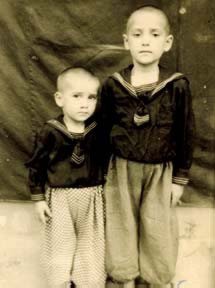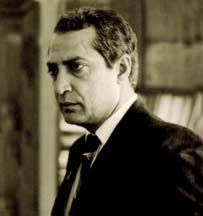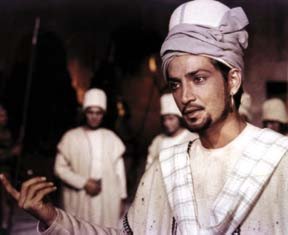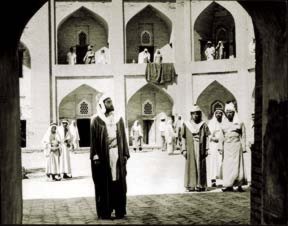|

Winter
1999 (7.4)
Pages
32-33
Famous People:
Then and Now
Rasim
Balayev
Actor (1948-)

Rasim (right) six
years old in Aghsu, 1954
|

Rasim Balayev |
Rasim Balayev has
performed some of the major roles in more than 50 movies, including
"Nasimi" (1974) and "Babak" (1979).
_____
What experiences and interests in childhood would you say
shaped your life and career?
I grew up in the Aghsu region. We didn't have TV when I was
a child. Television didn't come to Baku until 1956, or the outlying
regions until around 1960-1962, when I was attending secondary
school. So the only access I had to the world of cinema was through
the films shown at our youth club. Whenever I watched movies,
especially those made for kids, I used to imagine that I was
one of the actors. I didn't tell anybody about it. It was my
secret.
  Photos: Rasim Balayev in scenes
while playing the lead character in the film, "Nasimi" Photos: Rasim Balayev in scenes
while playing the lead character in the film, "Nasimi"
My interest in cinema emerged gradually-not all of a sudden.
I could read and recite well, and my literature teacher always
asked me to read the new lesson aloud. It wasn't until I was
15 or 16 that I started getting involved in dramatic performances.
The late actor Samandar Rezayev played an important role by encouraging
me to think seriously about becoming an actor; before that, I
thought of it only as a hobby. My family wanted me to choose
some other profession as no one else in my family was a movie
star. But to their credit, they didn't stop me.
So I began immersing myself in the humanities-subjects like literature
and history-because I knew I would be tested in these areas when
I applied to the Institute of Arts (Institute of Theater at that
time). I studied hard and succeeded.
How was your own childhood different from that of kids growing
up today?
  There are many differences
between our childhood and that of kids growing up today. First
of all, we were Soviet children. We became Octobrists, Pioneers
and eventually Party members. Today's atmosphere is totally different. There are many differences
between our childhood and that of kids growing up today. First
of all, we were Soviet children. We became Octobrists, Pioneers
and eventually Party members. Today's atmosphere is totally different.
To tell the truth, I don't envy today's youth. I see that there
is a strange chaos among them. I don't want to say that we-the
Soviet youth-were perfect. Of course we had our own deficiencies
as well. But we did believe in the future. We were constantly
striving to learn more and more. Bright children knew that they
were going to have a bright future.
But I don't see this happening today. Perhaps it's because today's
youth see that educated people are living under such bad conditions.
That's why there's a lack of faith.
Perhaps this lack of faith is a result of the transitional period
that we are living in, since there's so much uncertainty. The
Chinese have a curse: "May you live in a transitional period."
So, living in transitional times is difficult no matter where
you grow up.
There are also many differences in terms of the opportunities
that are available because of technology and information. Today,
kids can sit at home and be in touch with any part of the world
via computers. We didn't have such an opportunity. We never dreamed
of such things.
When I compare today with the past, I see that there is less
respect for adults. Perhaps I'm a person of old traditions, but
I don't like this trend. There are unwritten laws of society
that should be followed.
During the Soviet period, there were people who cared about the
development of children and youth. These days, youth of 13-14
are selling things and washing cars in the street instead of
going to school. There are more than a million refugees, whose
children are growing up under very difficult conditions. I'm
not a sociologist, so I can't analyze the impact this is having
on today's youth, but what I see is not encouraging at all.
In the past, if a child didn't go to school, even for a single
day, his teachers and schoolmates would start worrying about
him. They would go to his home, talk to his parents and even
appeal to the police department if they had no news for a few
days. If children were selling something or idling around on
the streets, they would be taken to the police, their parents
would be reprimanded and those children would be made to attend
school.
But today is much different. It's as though the kids are told:
"Go and do whatever you can." If a kid starts washing
cars when he is 13 or 14, tomorrow when he grows up, he won't
do it because he'll be ashamed. So what will he do then, since
he won't have an education?
So we're living in a society where everything has been messed
up. That's why when speaking about the majority, I can't see
a bright future for today's youth. On the other hand, there are
young people going abroad, studying and working and trying to
do something for their Motherland's sake. I appreciate what they're
doing. But we can't forget the general situation as well.
Also there are differences between the educational system. Today
there isn't the kind of intellectual competition that we experienced
as kids. We competed by reading books. Kids who read a lot used
to boast about it. But today's youth try to compete with each
other by buying expensive clothes and cars. They aren't competing
by reading and gaining knowledge.
What advice would you give to young people as they enter the
21st century?
Each person follows his own destiny in life. I would advise
today's youth to become as educated as possible no matter what
profession they pursue. Our youth have to be intelligent. They
have to be aware of world affairs. They should focus on science.
Today's youth are our future.
I'm sure that our society is going to develop, thanks to intelligent,
educated young people who are full of energy. Educated people
will live well and they will be respected in the society. I don't
know how soon it's going to happen, but eventually it will happen.
Today our nation is suffering from the problems that were created
both by our own faults as well as by problems that had nothing
to do with us. For example, nearly 20 percent of our lands are
being occupied by Armenians. I don't want to say that today's
youth are responsible for setting them free, since this situation
took place because of the adults. But let the youth also do their
best to free these lands. It's such a shame for our nation. Let's
try to release these lands so that future generations won't curse
us. I don't know how this will be done, perhaps by peace, by
policy or by something else. But we must do our best. We have
to do it.
If we want Azerbaijan to prosper, first of all, we must build
its economic system. We need clever youth to ensure a bright
future. Let them try to take advantage of these rich resources
because our nation also has the right to live well.
What would you say is your greatest achievement in life? What
do you want to be remembered for most?
I don't think that I'm an extraordinary person to be distinguished
from other people. I'm an ordinary Azerbaijani. If I've starred
in more than 50 films, and if these films have become part of
Azerbaijan's history, then I will also be remembered when these
films are remembered. I would be happy to be remembered that
way.
As for my greatest achievement, I am proud to say that I have
a profession that I love with all my heart and for which I am
ready to suffer any difficulty. Everyone should love the profession
he chooses. If you marry and then don't get along with your spouse,
you can get divorced and that's it. But it's hard to change your
profession or give it up. So if you choose a profession you love,
you'll be relatively happy. At least, I can say that I am.
Rasim Balayev was
interviewed by Aynur Hajiyeva in November 1999.
From Azerbaijan
International
(7.4) Winter 1999.
© Azerbaijan International 1999. All rights reserved.
Back to Index AI 7.4 (Winter
1999)
AI Home |
Magazine
Choice
| Topics
| Store
| Contact
us
|




